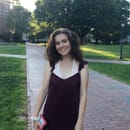I’ve always known I was meant to go into academia. There was a time I wouldn’t use that word specifically, but the fact of the matter remained that I was in love with learning in the formal style. I voraciously consumed books and lessons like they were oxygen, and I can talk a mile a minute — my path is pretty clear. I started as a freshman with my two majors declared, English and History, because I couldn’t decide on which domain I wanted to focus. I still haven’t, but an American Studies minor has been picked up, along the way.
During this wonderful week dedicated to women in the workforce, I want to focus on one specific aspect of my future, and that’s the field of History.
I have to say, it’s a little dusty. I’ve loved my time here so far. Nothing has detracted me from my goal, and I can’t imagine that anything will.
However, there was one event that made me hyper-aware of my womanhood. The event occurred in a classroom led by an influential female professor, but the situation didn’t involve her in any way, shape or form. See, we had been assigned some readings about the role of women in a specific era of history in a particular region of Europe. It was wartime, so some of the readings were dominated by nursing, which I’m not at all trying to demean. Nursing is invaluable and feminine and strong, but it’s certainly not the only thing women were doing to contribute directly to the war effort during this time.
I came into this classroom gung-ho and eager to discuss the texts, but, as per usual, this class was dominated by two upperclassmen majoring in History. And, despite the sixty pages of reading that were assigned, they were only capable of grasping on thing from the text: nursing, which, through the mainstream male gaze, is the sexiest, most effeminate and most acceptable career for a woman during the 20th-century wartime.
My professor started the class with commentary on the readings. The two upperclassmen talked more and more about nursing, and my professor seemed to hesitate at the front. She was intimidating and outspoken, and she never hesitated to speak her mind, but she was clearly choosing her words wisely now. She discussed the importance of nursing in-depth and opened the floor to more comments. Some comments poured in, but not at the same velocity that the nurse commentary had.
I frowned and shifted in my seat. Two upperclassmen majoring in History dominated the discussion of this class, and I came in a distant third. I had read the articles, and I was aware of the hearsay that clouded the Humanities’ reputations; the misogyny is still common.
Being a woman in History can be incredibly disheartening. There’s a forgotten feminine history; it vanished when it couldn’t fit into the molds of what many believe women were capable or incapable of accomplishing in the past, even when the facts lie blatant in the text.
At the same time, I think that’s one of the reasons why I want to go into academia, to unlock those histories of womanhood, to force them into the central narrative, to compel others to remember vanished women’s deeds, fresh in our consciousnesses.
This is the path I’ve chosen, curating history. I’m well aware of my presence as a woman, and I’m well aware of the perceptions that come with it. Regardless, I can’t wait for the future.


